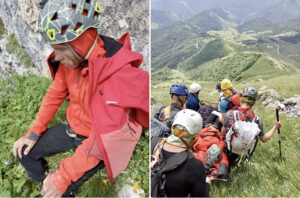Calum Muskett, a British Mountain Guide and one of the UK’s top young climbers, launched an independent study to look at how COVID-19 has affected his industry. He focused on four UK groups: the Mountain Training Association, Association of Mountaineering Instructors, British Association of International Mountain Leaders and British Association of Mountain Guides. He asked their members, all professional mountaineers, about their expected income this year compared to their actual 2018-19 income.

Calum Muskett. Photo: muskettmountaineering.co.uk
The uncertainty surrounding the pandemic, and government measures to slow the spread of the virus, mean that all outdoor work has shut down for spring and summer, so guiding will be disproportionately affected because of the timing of COVID-19. Members of these associations earned a total of £92.5 million (about $115 million) in 2018-19. Muskett estimates that this year they will earn 63.6% less. This means a loss of £58.8 million ($73 million) between March 14 and August 14, 2020.
In addition, he estimates that £17.1 million in non-refundable expenses will still have to be spent during this period to cover insurance, unused accommodation and travel, to honor terminated work contracts and other miscellaneous costs.
Between them, the four mountaineering associations have 7,184 professionally qualified members, made up of sole traders, limited companies and individual employees. The worst affected, with a 68% loss of earnings, will be limited company owners, who are ineligible for business grants. A close second will be the self-employed, who will likely see a 66% loss of earnings, since many of them are ineligible for the self-employment grant, since they joined the industry too recently (within the last three years). Note that this study does not consider the recently announced self-employment grants, business grants and measures for furloughed workers.

The impacts of COVID-19 on professional mountaineers. Photo: mountain-training.org
With financial costs far worse than those of Britain’s foot-and-mouth epidemic of 2001 and the global recession in 2007-8, he concludes that many outdoor businesses will be bankrupt by the end of 2020.






